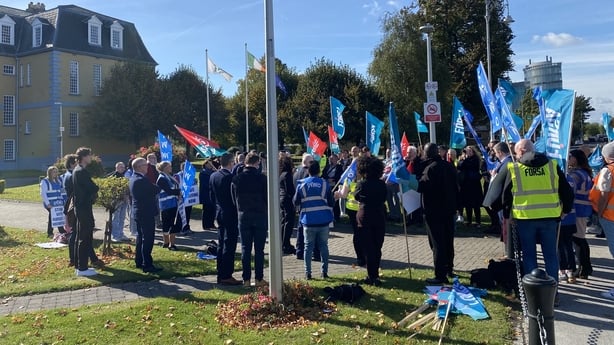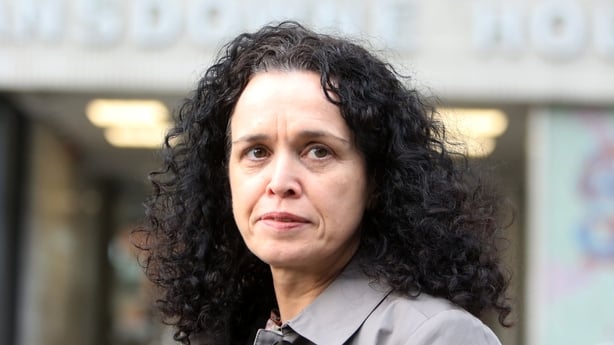Trade unions representing healthcare workers have staged the first of a series of lunchtime protests as part of a dispute over staff shortages.
The demonstrations were held at Cork University Hospital and at the Health Service Executive headquarters in Dublin.
The HSE described the action as "regrettable" against the background of additional funding for the health service.
The group of trade unions, which includes the Irish Nurses and Midwives Organisation (INMO), Fórsa and SIPTU, has said that continuing recruitment restrictions in the health sector are putting patient services under enormous strain.
The unions said that the HSE's recruitment moratorium means that thousands of unfilled vacancies have effectively been scrapped, resulting in staff shortages that are having a detrimental impact on patient care.
INMO and Fórsa members will be balloted for industrial action from 14 October.
INMO General Secretary Phil Ní Sheaghdha said that staff "are overstretched and want to be able to work safely" and claimed there has been an increasing focus on finance as opposed to patient safety.
"Directors of nursing have been stripped of their authority to recruit where they see gaps and where they see need. And there is a fairly, I suppose, focus now on the finances as opposed to patient safety. And that is what healthcare workers who work in the system are objecting to."

Ms Ní Sheaghdha told RTÉ's Morning Ireland that the recruitment moratorium was not lifted in July, and restrictive caps are in place.
"What happened in July of this year was the HSE decided that all posts that were not physically filled in December 2023 are gone.
"We now have a situation where, by our figures, there were just over 2,000 vacancies in the nursing and midwifery professions, and the system has now been told that they can't fill those because they don't exist."

Fórsa's Head of Health and Welfare Ashley Connolly said that dysfunctional spending patterns continue to be a problem for the HSE when it comes to expensive agency and overtime costs, as well as external management consultants.
"Fórsa members are protesting today and will be balloting for action because they are fighting to protect services, fighting to improve them, and determined that the HSE and Department of Health will listen," Ms Connolly said.
Sector Organiser with SIPTU's Health Division Damian Ginley said that frontline services are being negatively impacted by the HSE's pay and numbers strategy.
"As a policy, it does not take account of the need to expand services to provide quality care, allow for the roll-out of Sláintecare or our nation's population growth," Mr Ginley said.
The ICTU group of healthcare unions is made up of representatives from the INMO, SIPTU, Fórsa, the Irish Medical Organisation, Unite, Connect and the Medical Laboratory Scientists Association.
The Unite trade union, which represents a range of grades across the HSE, said it would commence a series of lunchtime protests next week and will also be balloting its members for industrial action.
"The HSE's recruitment cap is simply a backdoor hiring freeze, magicking away long-standing vacancies in the hope that patients and workers won’t notice," said Unite General Secretary Sharon Graham.
The HSE said: "In June this year, the CEO of the HSE welcomed the fact that we now have a clear view of the funding available for the remainder of 2024 and what's required to maintain existing levels of service in 2025.
"At that time, the HSE also finalised a Pay and Numbers Strategy which enabled the HSE to stabilise its workforce numbers and also allowed it to increase to 129,000 whole time equivalent staff by the end of 2024 (excluding disability services) which was unprecedented.
"We welcome the additional developments to be funded in 2025, which will add additional HSE staff to our overall workforce.
"Each of the six HSE Health Regions and each national service has now been provided with its own specified number of whole time equivalent staff, and can within that approved number, replace and recruit staff according to the priorities in their regions.
"Against the background of such funding it is regrettable that the unions have given notice of protests, and of their intention to ballot."
In a statement, HSE Chief Executive Bernard Gloster said: "Inclusive of both health and disability services our workforce grew by 23% between the start of 2020 and August 2024.
That is a growth of 27,901, and further growth is now approved.
"We are keeping workforce growth within what we can afford. But there is substantial growth, and so this is not a cut and should not be misrepresented as one.
"We must stay within what we can afford, and I hope our staff partners will work with us to continue to develop services through new resources and also changed practices," Mr Gloster said.







